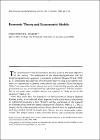| dc.contributor.author | Gilbert, Christopher L. | |
| dc.date.accessioned | 2012-08-30T15:19:35Z | |
| dc.date.available | 2012-08-30T15:19:35Z | |
| dc.date.issued | 1989 | |
| dc.identifier.citation | Gilbert, Christopher L. 'Economic theory and econometric models'. - Economic & Social Review, Vol. 21, No. 1, October, 1989, pp. 1-25, Dublin: Economic & Social Research Institute | |
| dc.identifier.issn | 0012-9984 | |
| dc.identifier.uri | http://hdl.handle.net/2262/64801 | |
| dc.description.abstract | The constitution of the Econometric Society states as the main objective of the society "the unification of the theoretical-qualitative and the empirical-quantitative approach to economic problems" (Ragnar Frisch, 1933, p. 1). Explaining this objective, Frisch warned that "so long as we content ourselves
to statements in general terms about one economic factor having an 'effect' on some other factor, almost any sort of relationship may be selected, postulated as a law, and 'explained' by a plausible argument". Precise, realistic, but at the same time complex theory was required to "help us out in this situation" (ibid, p. 2). | en |
| dc.language.iso | en | |
| dc.publisher | Economic & Social Studies | |
| dc.source | Economic & Social Review | en |
| dc.subject | Economic theory | en |
| dc.subject | Econometric models | en |
| dc.title | Economic theory and econometric models | |
| dc.type | Journal Article | |
| dc.publisher.place | Dublin | en |




